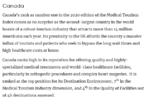A friend broke an ankle in Florida that required surgery so insurance wanted them to fly home which would have cost $25000, which was apparently the “better” option than remaining in Florida for surgery.
You are using an out of date browser. It may not display this or other websites correctly.
You should upgrade or use an alternative browser.
You should upgrade or use an alternative browser.
Universal Health Care - Still Not Possible in US
- Thread starter Brandon716
- Start date
Monarch Butterfly
Superstar
DanielMar_Toronto
New Member
I asked a question on Reddit not too long ago cause I was generally curious. Regarding medical tourism with Canada and the U.S., I thought this would be an interesting conversation in this thread.
————
Sort of copied from my Reddit question:
There's stories of Canadians going to the U.S. for medical reasons (long wait times in Canada, treatment not available in Canada, nearest "big hospital", etc..). Buffalo MRI seems to get a lot of Canadian patients.
There's also stories of Americans coming to Canada for medical reasons (cheaper prescriptions, special clinics like Shouldice, etc.).
The talk of this was big when Donald Trump talked about Canadians travelling to the U.S. for healthcare due to our "catastrophic" system. However, the numbers are truly unknown.
Out of curiosity, how many of you witnessed medical tourism along the U.S./Canada border (Do you know of any Ontarians going to the U.S. for healthcare and vice versa?)?
————
Sort of copied from my Reddit question:
There's stories of Canadians going to the U.S. for medical reasons (long wait times in Canada, treatment not available in Canada, nearest "big hospital", etc..). Buffalo MRI seems to get a lot of Canadian patients.
There's also stories of Americans coming to Canada for medical reasons (cheaper prescriptions, special clinics like Shouldice, etc.).
The talk of this was big when Donald Trump talked about Canadians travelling to the U.S. for healthcare due to our "catastrophic" system. However, the numbers are truly unknown.
Out of curiosity, how many of you witnessed medical tourism along the U.S./Canada border (Do you know of any Ontarians going to the U.S. for healthcare and vice versa?)?
Northern Light
Superstar
I asked a question on Reddit not too long ago cause I was generally curious. Regarding medical tourism with Canada and the U.S., I thought this would be an interesting conversation in this thread.
————
Sort of copied from my Reddit question:
There's stories of Canadians going to the U.S. for medical reasons (long wait times in Canada, treatment not available in Canada, nearest "big hospital", etc..). Buffalo MRI seems to get a lot of Canadian patients.
There's also stories of Americans coming to Canada for medical reasons (cheaper prescriptions, special clinics like Shouldice, etc.).
The talk of this was big when Donald Trump talked about Canadians travelling to the U.S. for healthcare due to our "catastrophic" system. However, the numbers are truly unknown.
Out of curiosity, how many of you witnessed medical tourism along the U.S./Canada border (Do you know of any Ontarians going to the U.S. for healthcare and vice versa?)?
I don't have any anecdotal data to contribute.
This policy brief from a right-wing think tank was published in 2019, and used 2017 data.
The data, it should be said a bit problematic, as it was extracted from surveys people fill out when returning to Canada at the border, and the qualitative level of the data was poor. (ie. depth, specific medical condition, destination, treatment/procedure/prescription sought)
Using their low-end number for Ontario, it would suggest ~1% of Ontarians sought some type of healthcare in the U.S. in the year 2017.
***
This study, which is profoundly out of date, aimed to put a harder number on things back in 2002:
From the above:
****
****
The number going the other way is harder to see.
But TVO took at a look back a few years ago, in respect of Americans skipping out of Canadian hospitals w/o paying:
Attachments
lenaitch
Senior Member
^^ I play on another forum that is mostly populated by Americans and there is one poster from western New York who tells us his health facilities are "full of Canadians".
A hospital in one town I lived in up north had a Visa sticker on the door of Emerg, which struck me odd until somebody explained that a very large part of the area's tourism is American. I can well imagine that many of the bills go unpaid. Hospital admin departments, especially small hospitals, aren't set up as accounts receivable or collections departments.
A hospital in one town I lived in up north had a Visa sticker on the door of Emerg, which struck me odd until somebody explained that a very large part of the area's tourism is American. I can well imagine that many of the bills go unpaid. Hospital admin departments, especially small hospitals, aren't set up as accounts receivable or collections departments.
Northern Light
Superstar
^^ I play on another forum that is mostly populated by Americans and there is one poster from western New York who tells us his health facilities are "full of Canadians".
Without a facility name, a bit challenging to verify an anecdote; but it may be entirely believable, depending on facility type.
I would imagine very few people without U.S. based health insurance would be crossing the border for very expensive cancer treatment or surgical care, and doing so for an emergency makes almost no sense.
On the other hand, I expect it may be quite common for relatively inexpensive procedures where one can queue-jump, like diagnostic imaging.
There are dedicated, free-standing facilities devoted to that in the Buffalo, area, all have pages of Canadians with prices in CAD:
MRI for Canadian and Ontario Patients - MRI in Buffalo
Canadian doctor serving Canadians needing an MRI Scan. Proscan Imaging Buffalo MRI services discounted for Ontario. #1 MRI for Canadian and Ontario Patients.
www.proscanbuffalo.com
DanielMar_Toronto
New Member
Yeah, if you look at Google Reviews of that Buffalo MRI Centre, there are definitely Canadians. The number is unknown, but I’d imagine there’s a good amount. I’m no supporter of the way the US does healthcare, but I can definitely see why someone rather pay $700 CAD in Buffalo and get it done “in 2 days” (rather than months in Ontario) if they felt something was serious.Without a facility name, a bit challenging to verify an anecdote; but it may be entirely believable, depending on facility type.
I would imagine very few people without U.S. based health insurance would be crossing the border for very expensive cancer treatment or surgical care, and doing so for an emergency makes almost no sense.
On the other hand, I expect it may be quite common for relatively inexpensive procedures where one can queue-jump, like diagnostic imaging.
There are dedicated, free-standing facilities devoted to that in the Buffalo, area, all have pages of Canadians with prices in CAD:
MRI for Canadian and Ontario Patients - MRI in Buffalo
Canadian doctor serving Canadians needing an MRI Scan. Proscan Imaging Buffalo MRI services discounted for Ontario. #1 MRI for Canadian and Ontario Patients.www.proscanbuffalo.com
There are facilities within id say 200 km of the Canadian border that advertise to Canadians as well.
Erie, PA: https://www.upmc.com/locations/hospitals/hamot/services/imaging/service-for-canadian-residents
The Mayo Clinic isn’t necessarily close to the Canadian border, but being rated as the best hospital in the world, it doesn’t shock me that they advertise https://www.mayoclinic.org/canada
Vice versa,
Toronto’s UHN (also a world renowned network) has a section dedicated to International Patients (https://www.uhn.ca/IHP), but how many of those are American? Probably not much, if not, any at all.
At Sick Kids, the Herbie Fund actually started with a boy from Brooklyn, NY who needed to come to Toronto for treatment that was rare.
Primary Care Niagara has a clinic in Fort Erie that advertises to Americans seeking cheaper prescription drugs in Canada
Out-of-Country Prescriptions
Looking to take a vacation from the high costs of US pharmaceuticals! We can do renewals for your prescriptions while you are here. In some cases you could save well over 50% on the cost of prescribed medication. We are seeing an increasing number of US patients like you requesting extended...
primarycareniagara.com
https://www.shouldice.com/become-a-patient/ Shouldice acknowledges US patients in its phone number section, but this hospital is kind of debatable given it’s for profit (Surgery itself is covered through OHIP, everything else is private, and I hear they make you stay a few nights after surgery that has to be privately paid for).
Yeah there have been debates over this, and it’s well known that these have been fabricated.I don't have any anecdotal data to contribute.
This policy brief from a right-wing think tank was published in 2019, and used 2017 data.
The data, it should be said a bit problematic, as it was extracted from surveys people fill out when returning to Canada at the border, and the qualitative level of the data was poor. (ie. depth, specific medical condition, destination, treatment/procedure/prescription sought)
Using their low-end number for Ontario, it would suggest ~1% of Ontarians sought some type of healthcare in the U.S. in the year 2017.
***
This study, which is profoundly out of date, aimed to put a harder number on things back in 2002:
***
This link is more recent and mentions numbers of Canadians in Buffalo hospitals. https://www.thenewshouse.com/border...ces-in-the-two-countries-health-care-systems/
Canadians going to U.S. (well, Buffalo), for care
“Dr. Samuel Cloud is one of Erie County Medical Center’s most experienced physicians. As the Center’s associate director of the Emergency Medical residency program, the Southern California native has been in the emergency room for over 17 years, treating all kinds of life-threatening injuries. Most of his patients come from Buffalo and the surrounding area in western New York, as Erie County Medical is classified as a level 1 trauma center. But in 2018, Cloud’s team saw one Canadian patient a week on average.”
”The 52 ER patients were among the 308 Canadians that Erie County Medical doctors treated last year. In 2017, 433 Canadian patients sought care there.
For those traveling to Erie County Medical, the hospital’s reputation and proximity to the border makes it a convenient choice, according to Cloud. Erie County Medical is actually closer to some border towns, such as St. Catharine’s, than the nearest equivalent treatment center in Canada.
Erie County Medical communications vice president Peter Cutler said that while the hospital doesn’t advertise specifically to Canadians, potential patients in Southern Ontario see their TV commercials that are on Buffalo area stations.
As for the kinds of procedures that Canadians are seeking, Cloud said it tends to be surgeries and treatments that may have longer wait times at Canadian hospital for patients willing to pay out of pocket.”
Vise Verca (no numbers are provided, but it’s worth mentioning since it’s in the article).
”For many Americans, the cost of paying for a procedure in Canada without insurance is cheaper than paying in the U.S. with insurance. But for others, Canadian health care provides another bonus – procedures that aren’t fully approved by the U.S. government can be performed there.
Robbie Hoover of Buffalo was one of the recipients of those procedures. When Hoover was 16, he was diagnosed with keratoconus – an eye condition that causes the cornea to bulge out and can cause the eye to go blind.
When Hoover and his family visited American doctors to find out what his options were, they were told he was only able to do corneal transplants, which would not have permanently stopped the disease. But one eye doctor offered him hope.
“(My eye doctor) said we could go to Canada to try a treatment there,” Robbie said. “All the other ones told me my best option was the transplant.”
Northern Light
Superstar
To steer this thread back towards its original subject for a moment.
At at 2023, estimates show about 9% of Americans lack health insurance entirely, and about 23% on average, are under-insured, meaning that co-pays and deductibles hinder their access to timely, quality care.
So healthcare access is a critical issue for about ~ 31% of Americans.
If the remaining states adopted Medicaid Expansion, as currently constituted, about another 3.5M would pick-up insurance. Good, but hardly good enough.
But its amazing what could be done without a 'Universal' public program, even if that might be the better choice.
Even Medicaid Expansion covers only households with up to 138% of the Federal poverty line in the U.S.
That, is an extremely low number. ($14,580USD for a single, childless adult), So that means the income cut-off would be just over $20,000USD.
Imagine a few modest changes.
1) Increase the federal poverty line number, which is unrealistically low. This could be done at a national level, but if it merely set the existing income limits as a base; then added accretive increases for higher cost areas, it would see millions more Americans insured.
2) Bolster the Medicaid Expansion threshold to 158% of the poverty line from 138%
3) Lower the Medicare threshold to age 60 (from 65)
4) Extend the Obamacare mandate to employers to provide insurance to smaller businesses. Currently businesses with fewer than 50 staff are exempt. Merely cutting this to 25 would do wonders.
The above, plus Medicaid expansion as is, if fully adopted, would cut the number of Americans without insurance to well under 4% (still too many, but much better than 9%
***
The under-insured issue is best addressed by mandating better minimum coverage, and capping deductibles and co-pays at lower levels.
Relatively small moves could easily cut the under-insured rate by 1/2
At at 2023, estimates show about 9% of Americans lack health insurance entirely, and about 23% on average, are under-insured, meaning that co-pays and deductibles hinder their access to timely, quality care.
So healthcare access is a critical issue for about ~ 31% of Americans.
If the remaining states adopted Medicaid Expansion, as currently constituted, about another 3.5M would pick-up insurance. Good, but hardly good enough.
But its amazing what could be done without a 'Universal' public program, even if that might be the better choice.
Even Medicaid Expansion covers only households with up to 138% of the Federal poverty line in the U.S.
That, is an extremely low number. ($14,580USD for a single, childless adult), So that means the income cut-off would be just over $20,000USD.
Imagine a few modest changes.
1) Increase the federal poverty line number, which is unrealistically low. This could be done at a national level, but if it merely set the existing income limits as a base; then added accretive increases for higher cost areas, it would see millions more Americans insured.
2) Bolster the Medicaid Expansion threshold to 158% of the poverty line from 138%
3) Lower the Medicare threshold to age 60 (from 65)
4) Extend the Obamacare mandate to employers to provide insurance to smaller businesses. Currently businesses with fewer than 50 staff are exempt. Merely cutting this to 25 would do wonders.
The above, plus Medicaid expansion as is, if fully adopted, would cut the number of Americans without insurance to well under 4% (still too many, but much better than 9%
***
The under-insured issue is best addressed by mandating better minimum coverage, and capping deductibles and co-pays at lower levels.
Relatively small moves could easily cut the under-insured rate by 1/2
lenaitch
Senior Member
I believe the poster I mentioned was talking about orthopedics, which is also a wait time issue for us. And I misspoke - he is in eastern upstate New York.
I have difficulty envisioning why a ER/trauma doctor would be seeing 52 Canadian patients. I do know on rare occasions they will transfer trauma patients - burn victims come to mind - to one of the Buffalo-area facilities that specializes in that field.
It seems the American voting public is quite happy with their 'non-socialist' medical care and are welcome to it.
I have difficulty envisioning why a ER/trauma doctor would be seeing 52 Canadian patients. I do know on rare occasions they will transfer trauma patients - burn victims come to mind - to one of the Buffalo-area facilities that specializes in that field.
It seems the American voting public is quite happy with their 'non-socialist' medical care and are welcome to it.
afransen
Senior Member
Quite a few Niagara residents spend quite a bit of time in WNY. A car accident here, a slip and fall there, and a heart attack after dinner on top. I don't think 1 a week would be hard to imagine.I believe the poster I mentioned was talking about orthopedics, which is also a wait time issue for us. And I misspoke - he is in eastern upstate New York.
I have difficulty envisioning why a ER/trauma doctor would be seeing 52 Canadian patients. I do know on rare occasions they will transfer trauma patients - burn victims come to mind - to one of the Buffalo-area facilities that specializes in that field.
It seems the American voting public is quite happy with their 'non-socialist' medical care and are welcome to it.
lenaitch
Senior Member
Yes, an angle I hadn't considered; a Canadian citizen in an American incident.Quite a few Niagara residents spend quite a bit of time in WNY. A car accident here, a slip and fall there, and a heart attack after dinner on top. I don't think 1 a week would be hard to imagine.
Northern Light
Superstar
It seems the American voting public is quite happy with their 'non-socialist' medical care and are welcome to it.
I'm not really sure that's true.
Certainly opinion surveys in the U.S. typically support some variation of 'Medicare for all'; or having a 'public option'.
Here's a survey from January.......

Majority in U.S. Still Say Gov't Should Ensure Healthcare
A majority of U.S. adults continue to think the federal government should ensure universal healthcare coverage, while they also prefer that the U.S. healthcare system be based on private insurance rather than government-run.
 news.gallup.com
news.gallup.com
57% favour universal health insurance, though 53% want it done through private insurance companies. This is, in essence their 'Medicare' model.
***
The thing is, you need to be able to actually vote for a party running on such a platform in the first place.
Which is rare; you know that party, in the current times would only be the Dems; and federally, they rarely have control across the House, the Senate and the Presidency.
When they do, they rarely seem to pass key platform planks; (for instance, the Dems have had complete control of Congress and the White House in two terms from Obama's first election.
Yet have never raised the minimum wage, federally, beyond a meager $7.25USD despite explicit campaign promises to do so.
TRONto
Active Member
US progressiveness has to start at the state level. My understanding is that Hawaii has quite extensive coverage "To date, Hawaii is the only state to have implemented near-universal health insurance. The cornerstone of this program is the country's only requirement that employers provide health insurance for all employees who work at least 20 hours per week."
Northern Light
Superstar
US progressiveness has to start at the state level. My understanding is that Hawaii has quite extensive coverage "To date, Hawaii is the only state to have implemented near-universal health insurance. The cornerstone of this program is the country's only requirement that employers provide health insurance for all employees who work at least 20 hours per week."
Hmm.
As at 2021, they reported an un-insured rate much below the U.S. average, but not the best:
Your mean rate, recall is 9%
The highest un-insured rate in the U.S. is found in Texas at 16.7%
Not sure about the other States, but I know Mass. achieves their result with an individual mandate that you must buy health insurance, and a financial penalty through your income tax if you fail to do so.
There are some exemptions.
kEiThZ
Superstar
I believe the poster I mentioned was talking about orthopedics, which is also a wait time issue for us. And I misspoke - he is in eastern upstate New York.
I have difficulty envisioning why a ER/trauma doctor would be seeing 52 Canadian patients. I do know on rare occasions they will transfer trauma patients - burn victims come to mind - to one of the Buffalo-area facilities that specializes in that field.
It seems the American voting public is quite happy with their 'non-socialist' medical care and are welcome to it.
We absolutely have two tier healthcare. The other tier that nobody talks about is access to foreign healthcare. There's a lot of focus on the US. But plenty of Canadians go to Asia for immediate treatment too. Talk to any Immigrant. At some point, somebody in their family, went to the old country to get something done. Either because of speed, or cost. My father, for example, got a ton of dental work done in India, while visiting relatives. Lot cheaper than Canada, even with the spousal dental coverage he got from my mom's work.
It's always been interesting to be that this aspect of two tier healthcare is almost never discussed in Canada.






